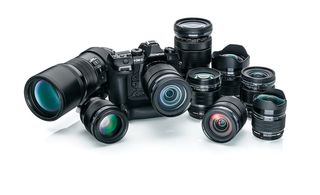Olympus exits the camera business – here's what it means for OM-D and Zuiko fans
Is this the end of the road for new Olympus cameras?

Update 24/6/20: we've heard back from Olympus and have included its comments further down this page.
Big news for camera fans just landed today – Olympus has announced that it's exiting the camera business by selling its imaging division to a Japanese investment fund.
The deal is currently at the memorandum of understanding (MOU) stage, but a final agreement is expected to be reached by September 30 and be completed by the end of the year.
The classic camera brand, which has been making cameras and lenses since 1936, was rumored to be shuttering its imaging division back in November 2019. Its CEO Yasuo Takeuchi refuted those rumors at the time, before backtracking on the possibility that it might be for sale.
The news raises two big questions: why is Olympus getting out of the camera business, and what does this mean for Olympus camera owners? The first of these has been answered pretty emphatically in the memorandum for the deal, with Olympus pointing towards the rise of smartphones as the main reason.
The company says "Olympus has implemented measures to cope with the extremely severe digital camera market, due to, amongst others, rapid market shrink caused by the evolution of smartphones".
As a result, Olympus has recently been more focused on the higher margin, pro-friendly cameras and lenses in its Micro Four Thirds lineup, like the Olympus OM-D E-M1 Mark III.
Get daily insight, inspiration and deals in your inbox
Get the hottest deals available in your inbox plus news, reviews, opinion, analysis and more from the TechRadar team.
But despite these efforts, Olympus says its imaging business "recorded operating losses for three consecutive fiscal years up to the term ended in March 2020". This harsh market reality, combined with the fact that imaging only accounts for 10% of the company's business, explains why it's now decided to walk away.

The future of Olympus
But does what this all mean for future Olympus cameras and those who already own an Olympus model?
We reached out to Olympus for comment and it told us "we are keen to stress to our customers that it is very much business as usual."
It added: "We are grateful to all our customers for their loyalty and support for our products, and their passion for photography. During the ongoing discussions, Olympus Imaging will operate with business as usual: we will continue to work on innovative initiatives for our customers and we will launch new products as planned."
Exactly which new products these will be remains uncertain, but the sale's memorandum states that the investment fund will "continue to provide supports to the imaging solution products that have been distributed by Olympus". Which suggests that existing agreements like warranties will be transferred to the new company.
It's not yet clear what the JIP investment fund intends to do with Olympus' imaging arm, but it's not necessarily the end of the road for its much-loved OM-D cameras or Zuiko lenses.

Lessons from the past
The fund will apparently "utilize the innovative technology and unique product development capabilities which have been developed within Olympus, and will realize continuous growth of the business by bringing better products and services to the users and customers".
In other words, it will take ownership of Olympus' existing models and look to develop new ones, possibly in line with some of the roadmap the company had outlined up to 2023.
To get a glimpse of Olympus' fortunes, we can look at what happened when the Japanese Industrial Partners (JIP) bought Sony's Vaio business when the company decided to get out of the PC market in 2014.
This resulted in the creation of a Vaio Corporation, which started off fairly slowly in the US and Asian markets before making a bigger comeback in Europe with a new Vaio range.
While it was nice to see the Vaio brand's return, its business laptops haven't been particularly well received. That said, a similar situation with Nokia, which licensed its name to Finnish company HMD Global, has resulted in a strong partnership that now produces a range of impressive, budget smartphones, so a sale like this isn't necessarily the end of the road for a much-loved brand.
For now, the Micro Four Thirds banner will be continue to be carried by Panasonic, which only today announced the new Panasonic G100. And for Olympus? We'll update this page as soon as we have any more official information on today's big news for camera fans.
- These are the best cameras you can buy right now

Mark is TechRadar's Senior news editor. Having worked in tech journalism for a ludicrous 17 years, Mark is now attempting to break the world record for the number of camera bags hoarded by one person. He was previously Cameras Editor at both TechRadar and Trusted Reviews, Acting editor on Stuff.tv, as well as Features editor and Reviews editor on Stuff magazine. As a freelancer, he's contributed to titles including The Sunday Times, FourFourTwo and Arena. And in a former life, he also won The Daily Telegraph's Young Sportswriter of the Year. But that was before he discovered the strange joys of getting up at 4am for a photo shoot in London's Square Mile.
Most Popular

